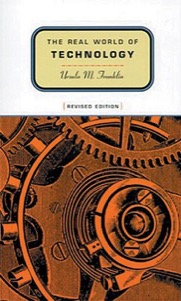I’ll be honest: I had never heard of this book, or the lectures they’re based on, until Ethan Marcotte started referring to them frequently in his posts. Ursula Franklin herself was someone whose name I had heard, but that was the extent of it. It’s an absolute shame that she and her ideas aren’t more broadly known. Not only were many of her ideas prescient, but they’re just downright important.
The Real World of Technology is based on, and expands on, a series of lectures that Ursula gave in 1989 about technology’s impact on the “real world”—the societal, political and ethical considerations that are so commonly overlooked.
It’s not a book for the faint of heart. The style is fairly academic and as much as I enjoyed it, I had to really slow down to fully absorb this one. In fact, I made it a point to listen to the lectures during my drives while reading the book to get the content from another angle. In retrospect, it was a really good choice. Listening to Ursula’s lectures hammered home what I was reading and, in some cases, registered with me a bit more clearly.
But the work is absolutely worth it—there are so many important concepts discussed that all too frequently go overlooked until it’s too late and we’re stuck dealing with the fallout.
She powerfully makes the case that you cannot consider technology in isolation and that technology itself can never be neutral because it is shaped by the environment around it:
What needs to be emphasized is that technologies are developed and used within a particular social, economic, and political context. They arise out of a social structure, they are grafted on to it, and they may reinforce or destroy it in ways that are neither forseen nor forseeable.
She tackles the way we repeatedly (and mistakenly) place our trust in technology over people (a timely word of caution given today’s propensity to solve problems with an algorithm):
Many technological systems, when examined for context and overall design, are basically anti-people. People are seen as sources of problems while technology is seen as a source of solutions…..The notion that maybe technology constitutes a source of problems and grievances and people might be looked up on as a source of solutions has very rarely entered public policy or even public consciousness.
All of this, and more, feeds into her primary narrative: that technology has real world ramifications and we have not given enough consideration to what that fallout is.
It’s a powerful warning that we didn’t pay enough attention to when she presented it in 1989, and one that feels critical to pay attention to today.
